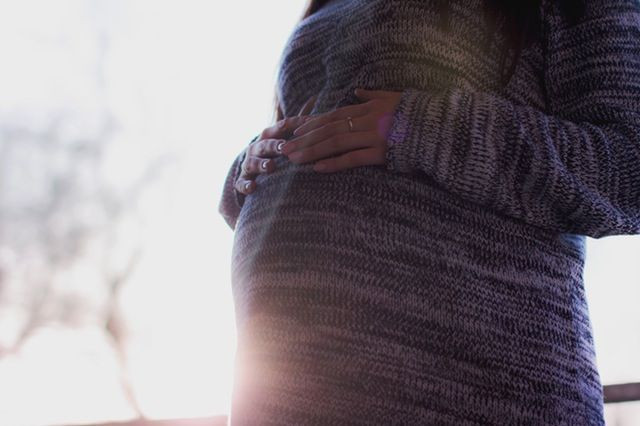Pregnant Women Who Get The Flu Shot Strengthen Their Babies' Immune Systems With Antibodies

Pregnant women are susceptible to complications that can affect their health, their fetus' health, or both. Prenatal visits, eating a healthy, balanced diet, and self-care all play a role to protect a baby’s health. Now, a recent study published in the journal Pediatrics suggests getting a flu shot during pregnancy can significantly reduce an infant’s risk of acquiring influenza within the first six months of life.
A newborn's immune system isn't strong enough to handle immunizations at birth, so they must wait until they're at least 8 weeks old. Until then, they must rely on the “passive immunity” they inherit from their mothers via the placenta, which provides them with the antibodies that help to protect against bacteria and viruses. This immunity, however, is only temporary and starts to decrease after the first few weeks or months of life.
"Babies cannot be immunized during their first six months, so they must rely on others for protection from the flu during that time," said Julie H. Shakib, study author and assistant professor of pediatrics, in a statement.
To protect them from influenza, Shakib said moms-to-be should get a flu vaccine during pregnancy, which will give their baby enough protection to last them up to six months old.
In an effort to evaluate the efficacy of the flu vaccine during pregnancy, Shakib and her colleagues examined more than 245,000 health records of pregnant women and more than 249,000 infant records for nine flu seasons from December 2005 through May 2014. Multiple births explain why the infant records outweighed the maternal records. During this time, more than 23,000 of the women reported being vaccinated during pregnancy, compared to over 222,000 who were not.
"About 50 percent of pregnant women reported being immunized in the latest flu season. But we need to get that number much closer to 100 percent," said Shakib, comparing flu immunizations from previous years.
The findings revealed there was a stark contrast between mothers who were immunized and those who were not. There was a 70 percent reduction in lab-confirmed flu cases and an 80 percent reduction in flu-related hospitalizations compared to those not immunized. Among 658 infants confirmed to have influenza, 638 cases occurred in babies whose moms were not immunized. Moreover, a total of 151 out of the 658 infants were hospitalized, with 148 being born to non-immunized mothers. This highlights the fact that about 97 percent of lab-confirmed flu cases occurred in infants whose mom's were not immunized against the disease during pregnancy.
In addition, the researchers sought to examine health records for the incidence of respiratory syncytial virus (RVS) — an infection that occurs in infants and young children during the winter months — to confirm whether the flu shot benefits were a coincidence or not. Here, the vaccine did not have any affect on the incidence of RSV among infants, suggesting the benefits seen in the infants were attributed to the flu vaccine their mothers received.
“Pregnant women are a high-risk group during influenza season and influenza outbreaks and should receive vaccinations," said Dr. Michael W. Varner, co-author of the study, maternal-fetal specialist, and professor and vice chair for research in the Department of Obstetrics and Gynecology.
He stresses pregnant women are more at risk of getting the flu because of pregnancy-related changes in the immune system, heart, and lungs, making them more prone to severe illness from the flu, hospitalizations, and even death.
A similar study published in American Journal of Obstetrics & Gynecology found newborns whose mothers received a flu shot during pregnancy were about 48 percent less likely to be hospitalized with the flu than newborns whose mothers were not immunized.
Newborns face an exceptionally high risk of getting the flu because their immature immune systems make them less able to fight the virus. Therefore, parents and other family members are advised to get vaccinated to help protect young babies from getting the flu. After the baby is older than six months, they need a flu vaccine every year, according to March of Dimes.
Babies who have the flu can exhibit different symptoms than people from different age groups. They may have a high fever and no other symptoms, or they may have vomiting and diarrhea. Red eyes or an earache are also common flu symptoms in newborns.
The decision to get immunized is always up to the mother and what she thinks is best for her baby.
Shakib does stress that she and her colleagues “really hope more pregnant women get the vaccine.”
Source: Shakib JH, et al. Infants much less likely to get the flu if moms are vaccinated while pregnant. Pediatrics. 2016.
Published by Medicaldaily.com



























